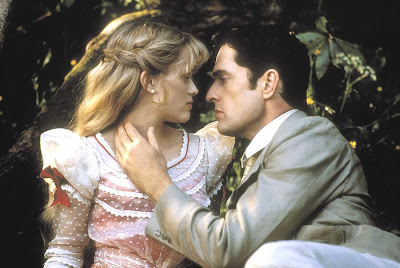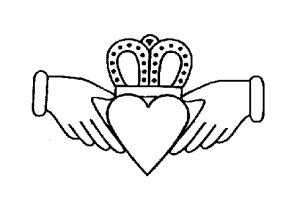John Riley è una ballata tradizionale di probabili origini seicentesche, diventata popolare negli anni 60.
Sebbene la versione standard sia diventata quella arrangiata da Joan Baez, la troviamo sia al di qua che aldilà dell’Oceano abbinata a diverse melodie, con piccole varianti testuali.
Versioni tradizionali dei Monti Appalachi
♬Pretty fair maid was in her garden (Cousin Emmy)
♬John Riley (Peggy Seeger)
Pretty fair maid was in her garden
L’arrangiamento di Cousin Emmy aggiunge il dettaglio del broken token, in questo caso un anello che i due fidanzatini si erano scambiati come pegno d’amore prima della partenza.
I
Pretty fair maid was in her garden
When a stranger came a-riding by
He came up to the gate and called her
Said pretty fair maid would you be my bride
She said I’ve a true love who’s in the army
And he’s been gone for seven long years
And if he’s gone for seven years longer
I’ll still be waiting for him here
II
Perhaps he’s on some watercourse drowning
Perhaps he’s on some battlefield slain
Perhaps he’s to a fair girl married
And you may never see him again
Well if he’s drown, I hope he’s happy
Or if he’s on some battlefield slain
And if he’s to some fair girl married
I’ll love the girl that married him
III
He took his hand out of his pocket
And on his finger he wore a golden ring
And when she saw that band a-shining
A brand new song her heart did sing
And then he threw his arms all around her
Kisses gave her one, two, three
Said I’m your true and loving soldier
That’s come back home to marry thee
traduzione italiana Cattia Salto
I
Una bella giovane fanciulla era in giardino
quando un forestiero a cavallo
venne al cancello e la chiamò
Disse “Bella fanciulla vuoi sposarmi?”
e lei rispose “Ho un amore che è militare,
ed è via da sette anni,
e anche se starà via altri sette anni
lo aspetterò ancora qui”
II
“Forse è annegato in qualche fiume
o deceduto su qualche campo di battaglia
o magari ha sposato una bella ragazza
e tu potresti non vederlo più”
«Se lui è annegato spero sia felice,
o se è caduto in qualche campo di battaglia;
e se ha sposato un’altra bella ragazza,
io amerò la ragazza che lo ha sposato “
III
Lui si tolse la mano dalla tasca
e al dito portava un anello d’oro (1)
e quando lei vide quella verga brillare
una nuova canzone il suo cuore cantò
e allora lui l’abbracciò
e le diede uno, due e tre baci
“Io sono il tuo amato soldato
che è ritornato per sposarti”
NOTE
(1) è il segno di riconoscimento, l’anello che si sono scambiati il giorno della partenza
La variante If you be he, and your name is Riley

Il testo di questa versione proveniente sempre dai Monti Appalachi mi ricorda la commedia di Oscar Wilde, “L’importanza di chiamarsi Onesto” (in inglese The Importance of Being Earnest) il contraddittorio di Wilde a Shakespeare nella famosa dichiarazione di Giulietta sul nome di Romeo:
“Che cos’è un nome? La rosa avrebbe lo stesso profumo anche se la chiamassimo in un altro modo.
Dunque cambia il nome, Romeo, e amiamoci tranquillamente.“.
E’ questa la melodia riportata dalla tradizione americana come collezionata sul campo (Providence, Kentucky) negli anni 30 da Alan Lomax.
Così scrive Joe Hickerson nelle note della versione di Peggy Seeger
“Ci sono due ballate intitolate “John (George) Riley” in American Balladry di G. Malcolm Laws dal British Broadsides (1957). Nel numero N36, l’uomo ritornato afferma che Riley è stato ucciso, in modo da mettere alla prova la costanza della sua fidanzata. Nel numero N37, che è la nostra ballata, non esiste tale rivendicazione. Piuttosto, lui suggerisce di salpare per la Pennsylvania; quando lei rifiuta, rivela la sua identità. Nelle molte versioni trovate, il cognome dell’uomo è scritto in vari modi, e in alcuni casi è “Young Riley”. Diversi studiosi citano una possibile origine nel “The Constant Damsel”, pubblicato in un libro di canzoni del 1791 a Dublino.
Peggy ha imparato la canzone durante l’infanzia da una registrazione sul campo dell’Archivio Folk della Biblioteca del Congresso: AFS 1504B1 come cantata dalla signora Lucy Garrison e registrata da Alan ed Elizabeth Lomax a Providence, nel Kentucky, nel 1937. Questa versione è stata trascritta da Ruth Crawford Seeger e inclusa in Our Our Countrying (1941) di John e Alan Lomax, p. 168. In precedenza, il primo versetto e la melodia raccolti dalla signora Garrison a Little Goose Creek, Manchester, Clay Co., Kentucky, nel 1917, apparivano in “English Folk Songs from the Southern Appalachians” (1932) di Cecil Sharp, vol. 2, p. 22. Il canto di Peggy è elencato come la fonte della ballata in pp. 161-162 de “The Folk Songs of North America” (1960) di Alan Lomax, con “melodie e accordi di chitarra trascritti da Peggy Seeger”. Nel 1964 è apparsa a p. 39 di Folk Songs di Peggy Seeger (Oak Publications, a cura di Ethel Raim). Peggy ha registrato su Folk-Lyric FL114, American Folk Songs per Banjo e suo fratello Pete ha incluso questa versione sul suo primo LP Folkways, FP 3 (FA 2003), Darling Corey (1950).” [1]
John Riley
Il dialogo tra i due sembra qui più una schermaglia tra innamorati in cui lei si dimostra freddina e offesa, mentre lui, ritornato dopo averla lasciata da sola per tre anni, scherzosamente finge di non conoscerla e le chiede di sposarlo perchè affascinato dalle sue grazie!
Così alla fine lei cede e parafrasando Shakespeare dice “If you be he, and your name is Riley [Earnest]..“
I
As I walked out one morning early
To take the sweet and pleasant air
Who should I spy but a fair young lady
Her cheeks being like a lily fair.
II
I stepped up to her, right boldly asking
Would she be a sailor’s wife?
O no, kind sir, I’d rather tarry
And remain single for all my life.
III
Tell me, kind miss, and what makes you differ
From all the rest of womankind?
I see you’re fair, you are young, you’re handsome
And for to marry might be inclined.
IV
The truth, kind sir, I will plainly tell you
I might have married three years ago
To one John Riley who left this country
He is the cause of all my woe.
V
Come along with me, don’t you think on Riley,
Come along with me to some distant shore;
We will set sail for Pennsylvanie
Adieu, sweet England, forevermore.
VI
I’ll not go with you to Pennsylvanie
I’ll not go with you that distant shore;
My heart’s with Riley, I will ne’er forget him
Although I may never see him no more.
VII
And when he seen she truly loved him
He give her kisses, one two and three,
Says, I am Riley, your own true lover
That’s been the cause of your misery.
VIII
If you be he, and your name is Riley,
I’ll go with you to that distant shore.
We will set sail to Pennsylvanie,
Adieu, kind friends, forevermore.
traduzione italiana Cattia Salto
I
Mentre passeggiavo di mattina presto
per prendere una boccata d’aria fresca
ho visto una bella giovinetta
dalle guance di pallido giglio
II
Mi sono fermato facendomi coraggio per chiederle
“Volete essere la sposa di un marinaio?“
“O no, signore, piuttosto
resto sola per tutta la mia vita!“
III
“Ditemi, gentile signorina, che cosa vi differisce
dal resto del genere femminile?
Eppure voi siete bella e giovane e cara
e siete di certo incline al matrimonio“
IV
“In verità, gentile signore, vi parlerò chiaro:
avrei potuto sposarmi tre anni fa
con John Riley che lasciò questo paese
causandomi un grande dolore“
V
“Venite con me, e non pensate a Riley,
venite con me in qualche lido lontano,
salperemo per la Pennsylvania
e addio alla dolce Inghilterra per sempre“
VI
“Io non andrò con voi in Pennsylvania
e non verrò con voi in qualche lido lontano,
il mio cuore è di Riley e non lo scorderò mai,
anche se non potrò mai più rivederlo“
VII
E quando vide che lei era sinceramente innamorata di lui le diede uno, due e tre baci
“Io sono Riley, il tuo vero amore
che è stato causa del tuo dolore“
VIII
“Se siete lui e il vostro nome è Riley
verrò con voi per qualche lido lontano,
salperò per la Pennsylvania,
addio cari amici, per sempre!“
[1] This is the melody in the American tradition as collected in the field (Providence, Kentucky) in the 30s by Alan Lomax. Joe Hickerson penned “There are two ballads titled “John (George) Riley” in G. Malcolm Laws’s American Balladry from British Broadsides (1957). In number N36, the returned man claims that Riley was killed so as to test his lover’s steadfastness. In number N37, which is our ballad, there is no such claim. Rather, he suggests they sail away to Pennsylvania; when she refuses, he reveals his identity. In the many versions found, the man’s last name is spelled in various ways, and in some cases he is “Young Riley.” Several scholars cite a possible origin in “The Constant Damsel,” published in a 1791 Dublin songbook.
Peggy’s learned the song in childhood from a field recording in the Library of Congress Folk Archive: AFS 1504B1 as sung by Mrs. Lucy Garrison and recorded by Alan and Elizabeth Lomax in Providence, Kentucky, in 1937. This was transcribed by Ruth Crawford Seeger and included in John and Alan Lomax’s Our Singing Country (1941), p. 168. Previously, the first verse and melody as collected from Mrs. Garrison at Little Goose Creek, Manchester, Clay Co., Kentucky, in 1917 appeared in Cecil Sharp’s English Folk Songs from the Southern Appalachians (1932), vol. 2, p. 22. Peggy’s singing is listed as the source for the ballad on pp. 161-162 of Alan Lomax’s The Folk Songs of North America in the English Language (1960), with “melodies and guitar chords transcribed by Peggy Seeger.” In 1964 it appeared on p. 39 of Peggy’s Folk Songs of Peggy Seeger (Oak Publications. edited by Ethel Raim). Peggy recorded it on Folk-Lyric FL114, American Folk Songs for Banjo and her brother Pete included this version on his first Folkways LP, FP 3 (FA 2003), Darling Corey (1950).” (from https://peggyseeger.bandcamp.com/track/john-riley)
FONTI
https://mainlynorfolk.info/eliza.carthy/songs/theyoungandsinglesailor.html
http://peggyseeger.bandcamp.com/track/john-riley
http://www.mustrad.org.uk/articles/bbals_38.htm
https://omeka.library.appstate.edu/items/show/31804#?c=&m=&s=&cv=
https://digitalcollections.uark.edu/digital/collection/OzarkFolkSong/id/2503/
http://www.bluegrassmessengers.com/92-a-pretty-fair-maid-down-in-the-garden-.aspx

